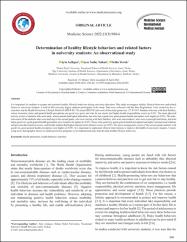| dc.contributor.author | Açıkgöz, Ayla | |
| dc.contributor.author | Şahan, Ayşe Gülay | |
| dc.contributor.author | Yörük, Selda | |
| dc.date.accessioned | 2024-02-05T15:58:58Z | |
| dc.date.available | 2024-02-05T15:58:58Z | |
| dc.date.issued | 2022 | |
| dc.identifier.issn | 2147-0634 | |
| dc.identifier.uri | https://doi.org/10.5455/medscience.2022.02.041 | |
| dc.identifier.uri | https://search.trdizin.gov.tr/yayin/detay/1130996 | |
| dc.identifier.uri | https://hdl.handle.net/20.500.12462/14312 | |
| dc.description.abstract | It is important for students to acquire and maintain healthy lifestyle behaviors during university education. This study investigates healthy lifestyle behaviors and related factors in university students. A total of 869 associate degree students participated in the study. Data were collected with the Data Registration Form created by the researchers and the Health Promotion Lifestyle Profile-II (HPLP-II). The mean HPLP-II total score of the study group was 127.9±19.9. Students who stay with their families, whose economic status and general health perceptions are good/very good, and who do not smoke had higher health responsibility scores (p<0.05). The mean physical activity scores of students who were male, whose parents had higher education, and who had a good/very good general health perception were higher (p<0.05). The nutri tion scores of the students who were studying in the second grade, who were staying with their families, who were non-smokers, who were overweight and obese, and who had a good/very good general health perception were found to be higher (p<0.05). Those with good/very good general health perception had higher interpersonal relations and personal development scores, and female students had higher interpersonal relations scores (p<0.05). The stress management scores of the second-grade students with good/very good general health perception were higher (p<0.05). It is important to implement lifestyle interventions to improve the health of university students. Considering socio-demographic factors in health promotion programs to be implemented may help develop healthy lifestyle behaviors. | en_US |
| dc.language.iso | eng | en_US |
| dc.relation.ispartof | Medicine Science | en_US |
| dc.rights | info:eu-repo/semantics/openAccess | en_US |
| dc.rights | Attribution-NonCommercial-NoDerivs 4.0 International | * |
| dc.rights.uri | https://creativecommons.org/licenses/by-nc-nd/4.0/ | * |
| dc.subject | Health Promotion | en_US |
| dc.subject | Health Behavior | en_US |
| dc.subject | Nutrition | en_US |
| dc.title | Determination of healthy lifestyle behaviors and related factors in university students: An observational study | en_US |
| dc.type | article | en_US |
| dc.contributor.department | Balıkesir Üniversitesi | en_US |
| dc.identifier.volume | 11 | en_US |
| dc.identifier.issue | 3 | en_US |
| dc.identifier.startpage | 980 | en_US |
| dc.identifier.endpage | 986 | en_US |
| dc.relation.publicationcategory | Makale - Ulusal Hakemli Dergi - Kurum Öğretim Elemanı | en_US |
| dc.buozel | trdizinideal | en_US] |
| dc.department-temp | Balıkesir Üniversitesi, Sağlık Bilimleri Fakültesi, Ebelik Bölümü, Balıkesir, Türkiye Ege Üniversitesi, Sağlık Bilimleri Enstitüsü, Geriatri Anabilim Dalı, İzmir, Türkiye Dokuz Eylül Üniversitesi, Sağlık Hizmetleri Meslek Yüksekokulu, İzmir, Türkiye | en_US |
| dc.identifier.trdizinid | 1130996 | en_US |
| dc.identifier.doi | 10.5455/medscience.2022.02.041 | |



















